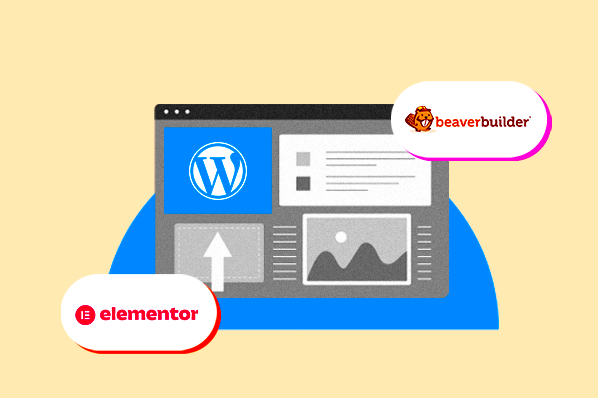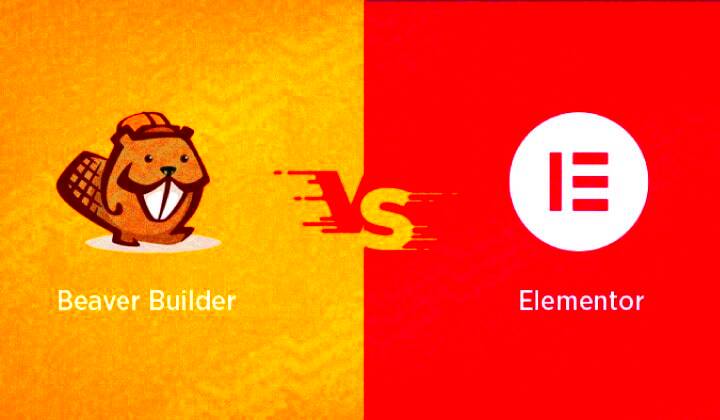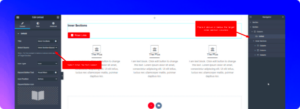When it comes to building stunning websites with WordPress, the right page builder can make all the difference. Two of the most popular options on the market are Beaver Builder and Elementor. Each has its unique features, strengths, and weaknesses. So, which one should you choose? In this post, we’ll take a closer look at both tools to help you determine which is better for your specific needs. Let’s dive in!
Overview of Beaver Builder

Beaver Builder is a powerful drag-and-drop page builder plugin that has gained a strong following among WordPress users. It’s particularly popular for its clean interface and ease of use, making it an excellent choice for both beginners and experienced developers alike. Here are some key features and benefits:
- User-Friendly Interface: Beaver Builder’s intuitive interface allows users to create layouts without any coding knowledge. Just drag and drop the elements you need!
- Pre-Built Templates: It comes loaded with numerous professionally designed templates that help jumpstart your web designs.
- responsive Design: All designs created with Beaver Builder are fully responsive, ensuring your site looks great on any device.
- Live Editing: Changes can be seen in real time with its front-end editing feature, making the design process smooth and straightforward.
- Developer-Friendly: Advanced users will appreciate its clean code and compatibility with other themes and plugins.
Beaver Builder comes in two versions: a free lite version suitable for basic use and a premium version that unlocks advanced features, such as additional modules and extensive support. Whether you’re developing a personal blog or a business site, Beaver Builder gives you the tools you need to create beautiful web pages efficiently.
Overview of Elementor
If you’re diving into the world of WordPress page builders, Elementor is likely one of the first names you’ll hear. Launched in 2016, Elementor has quickly garnered a vast user base, becoming one of the most popular page builders in the WordPress ecosystem. What makes
Elementor is a drag-and-drop page builder that allows users to design custom layouts without needing any coding skills. You can create beautiful, responsive websites using its robust set of widgets and templates. Whether you’re building a landing page, a blog, or a full-fledged e-commerce site, Elementor gives you the flexibility to design to your heart’s content.
One of the key advantages of Elementor is its real-time editing feature. As you make changes, you can see them appear instantly on your page, which helps you visualize your design choices effortlessly. Additionally, Elementor is compatible with any WordPress theme, which means you don’t have to rewrite your entire website just to use this powerful tool.
Elementor‘s success also hinges on its extensive library of pre-designed templates. These templates cater to various niches and styles, making it easy for users to jump-start their design process or get inspired. Combine that with its extensive third-party integrations, and you’ve got yourself a versatile tool that suits both beginners and seasoned developers.
Features Comparison
When it comes to comparing features, Elementor and Beaver Builder are two heavyweights in the page-building arena. While both are dedicated to making web design accessible, their specific offerings can make a significant difference based on your needs. Here’s a breakdown of key features:
| Feature | Elementor | Beaver Builder |
|---|---|---|
| Drag and Drop Interface | ✅ Smooth and intuitive | ✅ User-friendly |
| Live Editing | ✅ Real-time editing | ❌ Backend editing only |
| Templates and Blocks | ✅ Extensive library | ✅ Good selection |
| Responsive Design Options | ✅ Comprehensive controls | ✅ Responsive adjustments available |
| Cost | Free version and Pro Membership | Free version available, one-time payment for premium |
| Theme Compatibility | ✅ Works with any theme | ✅ Great compatibility |
| Backend Editing | ❌ Not available | ✅ Available |
Both tools provide excellent capabilities, but if you value a more visual, interactive page-building experience, Elementor might be the more appealing choice. On the flip side, if you prefer a simpler editing experience with strong backend support, then Beaver Builder could be your best bet. Ultimately, the choice comes down to your personal preferences and specific project requirements.
User Interface and Experience
When diving into the world of page builders, the first thing that often jumps out is their user interface (UI). Both Beaver Builder and Elementor boast attractive interfaces, but they cater to slightly different audiences and preferences.
Beaver Builder offers a more minimalist approach. Upon installing it, you’ll notice its clean layout that focuses on functionality without overwhelming you with options. The live drag-and-drop feature is intuitive, making it easy for both beginners and seasoned users to create stunning pages without a steep learning curve. The UI is organized into panels for modules, rows, and settings, allowing you to seamlessly navigate while building your site.
On the flip side, Elementor delivers a feature-rich experience that can be both thrilling and daunting at first glance. Its design includes a plethora of options at your disposal, which can be beneficial for advanced users looking for creative control. The visual editor is incredibly responsive, and it lets you see real-time changes, making it easier to visualize how your site will look. Elementor’s sidebar is packed with customization options, which allows for deep customization of each element.
Ultimately, the choice here largely boils down to your personal preference:
- Beaver Builder: Best for users who prefer simplicity and a no-fuss approach.
- Elementor: Ideal for users who crave more design options and aren’t afraid of a little complexity.
Performance and Speed
When considering a page builder, performance and speed are crucial factors that should never be overlooked. After all, a beautifully designed website is of little use if it takes forever to load! In the realm of Beaver Builder and Elementor, both of these tools aim for efficiency, but there are some nuances to keep in mind.
Beaver Builder tends to have the upper hand when it comes to speed. It is known for generating clean and optimized code, which usually translates to faster load times. Many users report that sites built with Beaver Builder perform exceptionally well on speed tests. This can also be attributed to its modular approach in adding elements, allowing for a lightweight design without unnecessary bloat.
On the other hand, Elementor has made significant strides in performance but can sometimes lag behind Beaver Builder, especially if you’re piling on the plugins and widgets. Its extensive customization options can lead to heavier code in some cases, potentially affecting load speeds. However, Elementor is actively working on improvements and updates aimed at enhancing performance across the board.
To further illustrate the differences, here’s a quick comparison table:
| Criteria | Beaver Builder | Elementor |
|---|---|---|
| Code Optimization | Excellent | Good, with room for improvement |
| Load Speed | Fast | Varies based on usage |
| Performance Impact | Minimal | Can be moderate with heavy use |
When it comes down to it, if speed and performance are top priorities for your site, especially for SEO and user experience, Beaver Builder might give you that slight edge. However, if you go with Elementor, you can still optimize performance with proper practices.
7. Pricing and Plans
When it comes to pricing, both Beaver Builder and Elementor offer some compelling options tailored for different user needs. Let’s break it down!
Beaver Builder operates on a straightforward pricing model. Here’s what you can expect:
- Standard Plan: Priced at $99 per year, it includes the essential features along with access to the standard templates and modules.
- Pro Plan: At $199 per year, this plan adds additional modules, and you gain access to the Beaver Themer feature, critical for those wanting advanced layout options.
- Agency Plan: For $399 per year, you can use Beaver Builder on unlimited sites and access the white labeling feature, perfect for agencies wanting a customized experience for clients.
On the other hand, Elementor adopts a freemium model. The basic version is free, allowing users to create simple pages effectively. However, to unlock its full potential, you’ll need to look at the paid plans:
- Essentials Plan: Priced at $59 per year, this plan is ideal for single websites, offering a range of pro widgets and templates.
- Advanced Plan: For $199 per year, this option caters to 3 websites, adding even more templates and advanced design capabilities.
- Expert Plan: At $399 per year, this plan allows usage on 25 sites, complete with all features and updates.
Ultimately, your choice between Beaver Builder and Elementor will hinge on your specific design needs, budget, and whether you prefer the premium features that both platforms boast.
8. Support and Community
Support and community engagement are critical factors in choosing between Beaver Builder and Elementor. Both platforms have their unique approaches to assist users, but let’s dive into the specifics.
Beaver Builder prides itself on solid customer support.
- Documentation: Their detailed documentation covers everything from setup to advanced features, ensuring you rarely feel lost.
- Support Tickets: They offer priority support through a ticketing system, generally receiving positive feedback for quick resolutions.
- Community Forum: A friendly user community exists, where you can ask questions and exchange tips with other Beaver Builder users.
On the flip side, Elementor has a vibrant support system as well.
- Documentation: Similar to Beaver Builder, Elementor has extensive documentation, but many find it more interactive and user-friendly.
- Live Chat Support: For Pro users, live chat support is available, providing faster resolutions during peak working hours.
- Community Forums and Groups: Elementor boasts a large community on platforms like Facebook, where users share insights, ask for help, and celebrate their designs.
In summary, both platforms offer robust support and thriving communities. It ultimately comes down to what type of support experience you prefer – personalized assistance through tickets at Beaver Builder or a more interactive community approach with Elementor.
9. Use Cases and Target Audience
When it comes to choosing between Beaver Builder and Elementor, understanding their use cases and target audience is key. Each of these page builders has carved out its niche, catering to different types of users and projects.
Beaver Builder is often embraced by:
- Small Business Owners: They appreciate Beaver Builder’s straightforward interface and ease of use, allowing them to create professional-looking websites without requiring deep technical knowledge.
- Agencies: Digital agencies tend to opt for Beaver Builder for its robust templating system, allowing them to create reusable templates and streamline their workflow for multiple client projects.
- WordPress Developers: Developers who utilize custom code often find Beaver Builder to be a great companion, as it allows for easy integration of custom elements and the choosing of more granular design options.
In contrast, Elementor tends to attract a different crowd:
- Bloggers and Content Creators: With its dynamic capabilities and visual appeal, Elementor is favored by those focused on engaging content and visually rich sites.
- Freelancers: Many freelancers prefer Elementor for its intuitive drag-and-drop interface, which empowers them to showcase their creativity without being bogged down by steep learning curves.
- E-commerce Websites: Elementor’s WooCommerce integration and advanced widget options make it ideal for users looking to set up online stores with compelling product presentations.
Both page builders cater to different types of users and project requirements, so your choice should depend on your specific needs and preferences.
10. Pros and Cons of Beaver Builder
Like any tool, Beaver Builder has its strengths and weaknesses. Let’s dive into a balanced view of what it offers.
| Pros | Cons |
|---|---|
|
|
Ultimately, whether Beaver Builder is the right choice for you depends on your specific website goals and how you prefer to work. By weighing these pros and cons, you can better assess if it aligns with your needs.
Pros and Cons of Elementor
Elementor has taken the WordPress community by storm, and for good reason! However, like any tool, it comes with its own set of advantages and drawbacks. Let’s dive into the pros and cons to help you get a clearer picture.
Pros of Elementor
- User-Friendly Interface: One of the biggest perks of Elementor is its intuitive drag-and-drop interface. You don’t need to have any coding knowledge to create stunning layouts.
- Responsive Design: Elementor allows you to customize how your site looks on different devices, ensuring that your website is mobile-friendly.
- Rich Widget Library: With a wide variety of widgets, from basic text to advanced sliders, you can find just about any element you need to enhance your site.
- Template Library: Elementor offers a plethora of pre-designed templates, saving you time in design and allowing you to get started quickly.
- Regular Updates: The team behind Elementor consistently releases updates, adding new features and fixing bugs, which enhances the platform’s reliability.
Cons of Elementor
- Performance Issues: Some users report that Elementor can slow down their site, especially if you use many complex elements.
- Learning Curve: While it’s easier than coding, new users may still face a learning curve when trying to access advanced features.
- Paid Features: To access certain templates and widgets, you may need to purchase the Pro version, which could add to your expenses.
- Lock-In Effect: Once you build your site using Elementor, switching themes or builders can be complicated and may require rebuilding some elements.
Conclusion: Which is Better for You?
So, you’ve weighed the pros and cons of Elementor, but which page builder is the best fit for you? The answer can vary depending on your specific needs, preferences, and technical skills. Let’s break it down.
When to Choose Elementor
If you’re looking for a user-friendly experience with a rich set of features and don’t mind investing in a premium version for advanced functionalities, Elementor might be right for you. It excels in flexibility and design options, making it an ideal choice for creative professionals or businesses that emphasize aesthetics.
When to Choose Beaver Builder
If you’re looking for a straightforward solution that prioritizes ease of use and stability, and you prefer not having to deal with as many performance issues, Beaver Builder could be a better choice. It’s also fantastic for agencies that need a more streamlined process when designing sites for clients.
Final Thoughts
Ultimately, both Elementor and Beaver Builder have their unique strengths and weaknesses. The best choice comes down to your personal requirements and what you value more—rich features or simplicity and stability. No matter what you choose, both tools will help you craft an amazing website!



